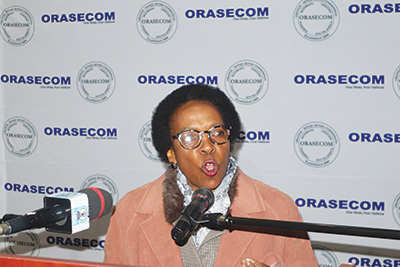By: Thandiwe Kubere
Orange- Senqu River Commission (ORASECOM) held a stakeholders consultation workshop yesterday where women are called on board to manage water resources. The workshop was on the participation of women in water diplomacy – in saving and managing of water resources as well as their ability to work in leadership positions. Present were civil and non-profit organizations, water sector and environmental experts.
The deputy chairperson and national coordinator of geography and environmental movement Lesotho (GEM) Manthatisi Makhaola, explained it as a registered school-based non-profit making organization whose main aim is to capacitate, educate and raise awareness among learners, teachers and all stakeholders on multi-environmental issues and natural resource management for sustainability.
As part of its mandate to promote the sustainable and equitable development of the water resource in the Orange Senqu river basin with its stake parties, Makhaola stated that the government of Lesotho through the Ministry of natural resources is equally engaged in the development of the guiding framework on women involvement in water diplomacy (WIWD).
“In line with integrated water resource management, the Ministry of natural resources, through the Orange Senqu river basin commission finds it imperative to adopt gender mainstreaming strategy to promote gender equity and equality because without safely managed water, sanitation and hygiene services, women and girls are more vulnerable. They are more vulnerable to abuse, attacks and ill-health affecting their ability to study, work and live in dignity, she said.
She further said if appropriate measures to manage water resources get delayed, a war may erupt for clean drinking water, for water is an integral part of life and without it, life is threatened. The consultation workshop was therefore on how women can be included in the saving and managing of water resource. “For we know that women are at the helm of water use owing to the gender chores that have been allocated to them”, she said.
Deputy Principal Secretary of the ministry of natural resource Mr Lisema Lekhooana said women are often regarded as water because water is the source of life and adapts to the way of life in wherever it goes. One of the principles in the water integration states that women play a crucial role in the managing and using of water resources. “However women in particular as decision makers is entwined with gender hierarchy and roles within different cultures leading to exceeding communities which ignore women participation in the water management. Although gender issues are always reflected in statements, there is still a long way to go.” He therefore said special efforts need be made to ensure women’s participation in all organizational levels.
Explaining the detailed objective of the workshop, member of the Nile basin women in the water diplomacy organization, Dr. Ntombizodwa Dlamini said ORASECOM is working on the development of women in the water diplomacy.
“The network that we are talking about is very crucial. One of the objectives of this workshop is all about, is to ensure all the stakeholders in the four countries are involved in the development of this guideline framework for the development of women in water diplomacy framework. She mentioned this was a consultative workshop which is going to take place in four countries, and Lesotho is fortunate to have been the first country to hold the workshop.
“Your thoughts and voices will be heard because this consultation is all about you. Fortunate enough, when you look at where we come from as the Nile basin, we have already achieved a lot in terms of empowering women and young professionals. The same can be said about Asia and Afghanistan where we have a similar network which we call a global programme”, she said.
Adding that the roles of women are often downplayed because there are a few women in high-level decision making positions and the organisation aims to promote women, as well as to prove that they participate and are not just assistants. She therefore encouraged women to give each other the necessary support and mentoring because it does not hurt to have others in those positions. Another important element that was mentioned the organization is going to have male “champions” who are placed to support and mentor women to be in leadership positions.
About ORASECOM
Orange-Senqu sources in highlands of Lesotho at around 3000 metres above mean sea level (alpine wetlands “sponges”) – very important for sustaining flows especially in dry season and during drought periods
ORASECOM agreement was signed on 3rd November 2000 by Republic of Botswana, Kingdom of Lesotho, Republic of Namibia and Republic of South Africa (within framework of SADC Protocol on Shared Watercourse Systems Article 5,3 which in turn is derived from principles of UN Convention on Non-Navigational Uses of Water)
- Commission was established to advise Parties on matters related to development, utilisation and conservation of the water resources in the River system.
- Areas of Advise include:
- determination of yield;
- equitable and reasonable utilisation of water resources;
- investigations and studies on development of the river system;
- stakeholder participation, harmonisation of policies and impact of water resources development on social, cultural, economic and natural environment;
- standardised form of collection, processing and dissemination of data and information
- prevention of pollution and control of aquatic weeds;
- contingency plans for responding to emergencies resulting from natural causes such as droughts, floods and industrial accidents;
- exchange of information and consultations on possible effects of planned measures.
- Measures with a view to arriving at settlement of dispute between two or more of the Parties.
- Any other matters as may be determined by the Parties.


